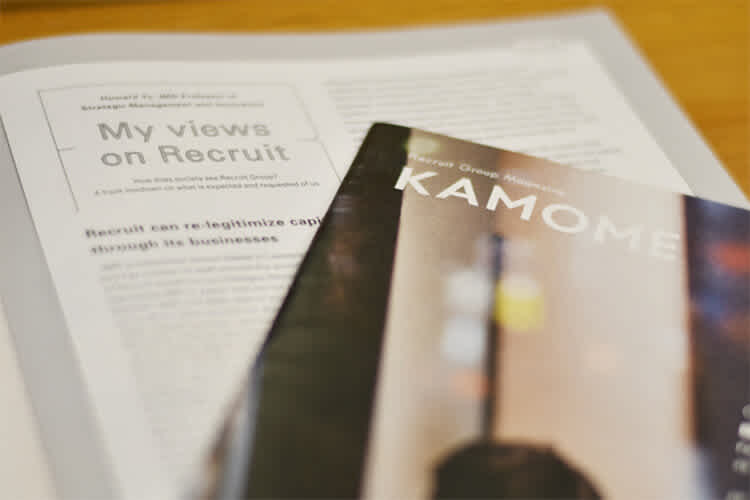How does society see Recruit Group? A frank lowdown on what is expected and requested of us.
This article was originally posted on "Kamome", Recruit Group Internal Magazine.

Recruit can re-legitimize capitalism through its businesses
IMD is a business school based in Lausanne, Switzerland, and has number of staff around the world. I became aware of Recruit thanks to my colleague Naoshi Takatsu. He represents IMD in Japan now but he had worked for Recruit between 2002 and 2009, before joining IMD.

The opportunity came about when he told me about this innovative Japan-based business, seemingly symbolizing a pioneering spirit and creating new business models on a daily basis.
A few unique aspects became apparent to me, following discussion with Recruit's executives and management personnel, as well as my own ongoing research into the company. What first stood out was the way both executives and management were very sensitive to the market climate and any change in customers. When something does go wrong, most companies would start by looking in house. Recruit is the polar opposite...over and above internal constraints, Recruit truly focuses on external changes as the priority. That really impressed me. Considering what the right option for the customer or client would be, and what risks would be entailed in providing it - I found the concept of a business model starting from the customer perspective truly fascinating.
When many major companies roll out new businesses or services, they tend to be perfectionist. They end up no longer listening to the feedbacks from the market and in many cases, the propensity to look inward in a type of silo approach seems to intensify. Recruit, however, pioneered development from a relatively early stage in striving for deliverables that meet customer needs by monitoring external events, instead of keeping the focus in-house. Plus, as well as improving the level at the front line, top management also spearheads dynamic reforms, which include actively creating new companies.
In other words, the approach is neither top-down nor bottom-up. Different layers within the Recruit organization are involved in innovative actions. I think this ceaseless recalibration is the key which allows Recruit to adjust in response when market changes occur.
In general, what may be considered a strength under one circumstance could be a hindrance in another. Recruit has leveraged the aforementioned strengths to establish a position of overwhelming competitiveness in Japan. I believe the efforts to promote globalization are now underway, and some aspects of these strengths in Japan will have to be reviewed for oversea's markets. Could be business models adjustment, behavioral changes, or revision of some business rationales... Recruit should start from becoming highly aware of its current strengths, yet it should also ensure that the domestic success so far would not become a hindrance in any shape or form down the road. I do see the need for Recruit to push forward with the required changes overseas.
Anybody in Recruit can be an innovator. No matter what function or task you play, you should never rest on the status quo, you should have the courage to see if a particular process is really needed, if there is any room for more productivity, if more value can be added to a particular component of the value chain. Outstanding sense of ownership shall lead to continuous improvement in daily work. Go beyond the scope of your own company, and carefully scrutinize other areas and industries, their life cycles and activities in doing so. That said, instead of simply and blindly benchmarking competitors, you should zero in on what is really happening, what are the rationales behind, in order to lead your observations into a real and applicable learning.
When you look at the world now, you see that the legitimacy of capitalism is being questioned. The income and wealth disparities are on the rise, while the social mobility is in decline. It would be wonderful to continue to see Recruit contribute to the re-legitimization of capitalism. Concretely, to see Recruit's continuous support to the small and medium sized enterprises leading to their higher productivity, their more acute focus on their core, value-adding tasks, and greater employment in their local markets. The true value of Recruit's interventions will be confirmed when these locally based companies can reaffirm that they are competing in a fair environment. I look forward to seeing such values of Recruit's interventions at a larger, and more global scale. I cannot wait to see that.
Howard H. Yu
IMD Professor
Howard obtained a DBA (doctoral degree of business) from Harvard Business School in 2011 and is currently a professor of strategy management and innovation at IMD (International Institute for Management Development), a Swiss-based top ranked business school focusing on executive education. In 2015, he was featured in a well respected higher education resource, as one of "the Best 40 Under 40" professors. He also regularly contributes columns to top publications such as 'Fortune', 'Forbes' and the 'South China Moring Post' (SCMP) among others. The case he co-authored with his two IMD colleagues on Recruit entitled "Recruit Japan: Harnessing Data to Create Value" won the Outstanding Case Writer Competition at The Case Centre Awards and Competitions 2017 in the field of 'Big Data - Risks and Opportunities'. Howard's Twitter account @HowardHYu
Keep up to date with the latest innovation cases and trends addressed by Professor Howard via Twitter.